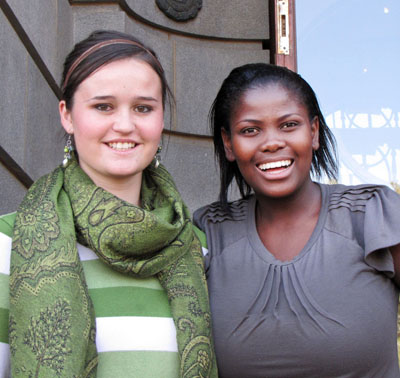Latest News Archive
Please select Category, Year, and then Month to display items
12 January 2024
|
Story Nonsindiswe Qwabe
|
Photo Sonia Small
 Since joining the UFS in 2008, Dr Grey Magaiza has worked extensively on approaches that can foster the socio-economic transformation of societies.
Since joining the UFS in 2008, Dr Grey Magaiza has worked extensively on approaches that can foster the socio-economic transformation of societies.
“The future should be one where communities can decide on their development agenda and futures. That’s the most important for me.” Dr Grey Magaiza, Deputy Director of the Centre for Gender and Africa Studies (CGAS) and Head of the Community Development programme on the Qwaqwa Campus, is passionate about capacitating communities to be agents of change and advancement. His vision for the future emphasises the empowerment of communities to take charge of their development by actively participating in decision making and the implementation of development projects that can improve their lives.
Since joining the UFS in 2008, Dr Magaiza has worked extensively on approaches that can foster the socio-economic transformation of societies. Over the years, he has crafted his research speciality into one that he is most proud of – being an interdisciplinary scientist immersed in the development of communities.
“I’m in a fortunate position of researching what I like. I say ‘fortunate’, because I’ve taken the time to understand what I’m passionate about, which is the overall field of rural livelihoods and livelihood futures – in short, community development. My research starts from an engaged university, understanding the elements that a university must use to enhance transformation and relevance to its immediate community in terms of development.”
One of the ways he has done this is by looking at social entrepreneurship as a development approach for young people in a rural setting. Through workshops with non-profit and civic organisations in Qwaqwa, Dr Magaiza has been helping these organisations to map out their needs and actively meet them through the involvement and support of external role players.
“We understand that communities are part of the national development agenda, but even that national agenda respects community knowledge and intentions and allows communities to shape their identity. A critical enabler of this is community organising. You bring back the capacity in communities to have dialogues on issues affecting them as spaces for engagement, knowledge exchange, and for people to just talk about their way forward.”
By enabling communities to define their development agenda, they can address their specific needs, challenges, and aspirations, he said. “When I look at livelihood futures, it’s quite an exciting aspect of my work – it’s like looking into a fortune tellers’ globe, because you’re not deciding for communities what they should do, but the communities themselves take those decisions.”
Student Transformation Forum kicks off
2010-08-19
 |
|
Ms Nida Jooste and Ms Modieyi Mothole
Photo: Lize du Plessis
|
The establishment of a Broad Student Transformation Forum (BSTF) at the University of the Free State (UFS) was initiated yesterday with a student consultative forum called to determine the agenda and delegations to the BSTF.
The establishment of the BSTF follows the suspension of the functioning of the Student Representative Council (SRC) recently and aims to provide students broadly with the opportunity to reach consensus regarding student governance at the Main Campus in Bloemfontein.
The meeting was chaired by student affairs specialist Prof. Cecil Bodibe and was attended by representatives from student associations from all faculties, representatives of non-faculty student associations and representatives from residences. Commuter students were represented through private student associations.
“The meeting clearly expressed agreement that decisions taken by the BSTF should ensure that the student body and student-life programmes truly reflect our constitutional commitment to building a non-racial, non-sexist and democratic society, and that collaboration between students and management in affecting the decisions of the BSTF to achieve this should be prioritised,” Mr Rudi Buys, Dean of Student Affairs, said.
The forum agreed that apart from addressing specific questions pertaining to student governance, the BSTF should also address transformation issues broadly. The forum also agreed that the delegations to the BSTF should ensure that the forum is truly representative of the diverse student population and is inclusive of all stakeholder groups, including international students and students with disability. A proper process to determine the credentials of participating association was requested and will be implemented.
The meeting furthermore expressed the wish that the BSTF should exist only to determine the key changes that should be made to student governance now, so that the postponed SRC elections may continue as soon as possible. The BSTF will thus have a temporary role to enable the student body to reach consensus regarding changes to the SRC constitution.
Meanwhile, an Interim Student Committee (ISC) was appointed, which has the role to ensure the continuation of daily student life programmes and to ensure student representation in management and governance of the university continues during the deliberations of the BSTF. The ISC serves as an interim structure that will dissolve when a new SRC takes office following the outcome of the BSTF and the continuation of the SRC election.
The ISC consists of 15 members who were appointed through a process of nomination of four (4) members each from the faculty-student associations, non-faculty student associations and from residences, and three (3) members from the student executive committees of Kovsie Community Service, the Irawa student newspaper and the Kovsie Rag executive committee.
The ISC elected Ms Modieyi Mothole and Ms Nida Jooste as its chairperson and deputy-chairperson, respectively.
“I’m encouraged with the initiative and response of students to ensure student governance continues, which bears witness to the depth of leadership our student body holds, while the level of engagement by students in the BSTF indicates that the student body seriously consider issues of transformation,” said Mr Buys.
Media Release
Issued by: Lacea Loader
Director: Strategic Communication (actg.)
Tel: 051 401 2584
Cell: 083 645 2454
E-mail: loaderl@ufs.ac.za
19 August 2010